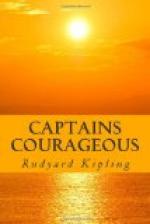Tom Platt dealt with his interminable trip round the Horn on the old Ohio in flogging days, with a navy more extinct than the dodo—the navy that passed away in the great war. He told them how red-hot shot are dropped into a cannon, a wad of wet clay between them and the cartridge; how they sizzle and reek when they strike wood, and how the little ship-boys of the Miss Jim Buck hove water over them and shouted to the fort to try again. And he told tales of blockade—long weeks of swaying at anchor, varied only by the departure and return of steamers that had used up their coal (there was no chance for the sailing-ships); of gales and cold that kept two hundred men, night and day, pounding and chopping at the ice on cable, blocks, and rigging, when the galley was as red-hot as the fort’s shot, and men drank cocoa by the bucket. Tom Platt had no use for steam. His service closed when that thing was comparatively new. He admitted that it was a specious invention in time of peace, but looked hopefully for the day when sails should come back again on ten-thousand-ton frigates with hundred-and-ninety-foot booms.
Manuel’s talk was slow and gentle—all about pretty girls in Madeira washing clothes in the dry beds of streams, by moonlight, under waving bananas; legends of saints, and tales of queer dances or fights away in the cold Newfoundland baiting-ports Salters was mainly agricultural; for, though he read “Josephus” and expounded it, his mission in life was to prove the value of green manures, and specially of clover, against every form of phosphate whatsoever. He grew libellous about phosphates; he dragged greasy “Orange Judd” books from his bunk and intoned them, wagging his finger at Harvey, to whom it was all Greek. Little Penn was so genuinely pained when Harvey made fun of Salters’s lectures that the boy gave it up, and suffered in polite silence. That was very good for Harvey.
The cook naturally did not join in these conversations. As a rule, he spoke only when it was absolutely necessary; but at times a queer gift of speech descended on him, and he held forth, half in Gaelic, half in broken English, an hour at a time. He was especially communicative with the boys, and he never withdrew his prophecy that one day Harvey would be Dan’s master, and that he would see it. He told them of mail-carrying in the winter up Cape Breton way, of the dog-train that goes to Coudray, and of the ram-steamer Arctic, that breaks the ice between the mainland and Prince Edward Island. Then he told them stories that his mother had told him, of life far to the southward, where water never froze; and he said that when he died his soul would go to lie down on a warm white beach of sand with palm-trees waving above. That seemed to the boys a very odd idea for a man who had never seen a palm in his life. Then, too, regularly at each meal, he would ask Harvey, and Harvey alone, whether the cooking was to his taste; and this always made the “second half” laugh. Yet they had a great respect for the cook’s judgment, and in their hearts considered Harvey something of a mascot by consequence.




